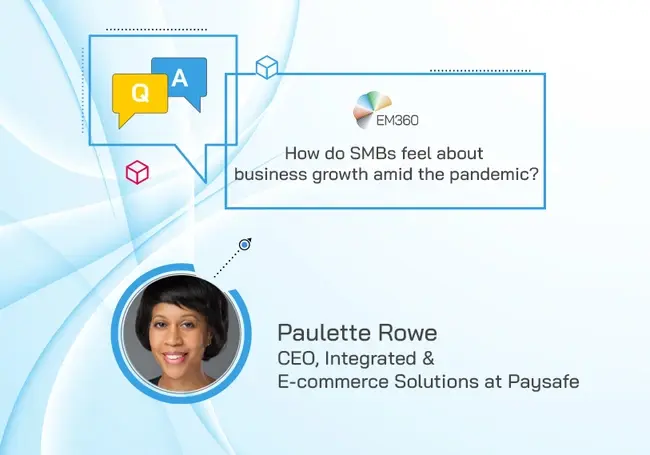When COVID-19 first emerged, companies were concerned about how it would limit their business. Would fewer customers be willing to make purchases? Would having employees work from home curtail productivity within the business? Worse still, would the business actually be able to survive such a disruption?
However, as the year has progressed and the ‘new normal’ becomes no longer new, some industries have found that the pandemic has not been a limitation, as such. Rather, COVID-19 has also presented an opportunity to accelerate innovation and digital transformation.
Testament to this is Paysafe’s Lost in Transaction report. In particular, the company’s research found that despite negative forecasts amid the pandemic, SMBs have remained optimistic as a result of changes to their business model following the pandemic.
Joining us to tell us more about the study and its findings is Paulette Rowe, CEO, Integrated and E-commerce Solutions, Paysafe.

Paulette, thank you so much for joining us! Firstly, could you give us an outline of what the study investigated and how it was conducted?
Every year, we commission two sizable research projects to help us better understand the shifting payments landscape and we launch these as part of our ‘Lost in Transaction’ report series. The first annual survey focuses on consumers and their changing attitudes to different payment methods, including their preferences and concerns when evaluating different ways to pay such as security and convenience. In the second we ask businesses what their plans are to evolve their checkout either in-store or online, and whether they have observed a change in consumer habits that they’re reacting to.
Earlier this year we focused our consumer survey on how people were making payments differently in the wake of the COVID-19 pandemic, and in May we published our first report, Lost in Transaction: The impact of COVID-19 on consumer payment preferences. The research surveyed 8,000 consumers in the UK, US, Canada, Austria, Germany, Italy and Bulgaria on whether COVID-19 had affected their physical and digital spending habits.
For our latest report, Lost in Transaction: How COVID-19 has reshaped the SMB checkout, we asked 1,100 online businesses in the same seven countries, and 350 stores in the US and Canada, about the changes they have made to their payment acceptance to survive and thrive in an era of social distancing, their plans for further evolving their checkout, and their overall outlook for the future of their business. The research was conducted in September 2020 and we commissioned Sapio Research to carry out both pieces of research.
Can you share some of the key findings of the report with us?
The overall picture that emerged from the research is that businesses have been very active in the main when it comes to adapting their checkouts to the new environment, and where businesses have taken steps to update their payment acceptance the results have been positive. For example, 82% of online businesses have made at least one change to the way they accept payments this year and 42% have integrated at least one new payment method into their online checkout, with two thirds (67%) of businesses being able to attribute an increase in sales to doing so. On the in-store side this is even more pronounced; 88% of businesses have made a change to payment acceptance and 80% of these businesses say this has had a positive impact on sales.
One reason for this positive impact is that businesses have noticed a change in consumer behaviour since the outbreak of COVID-19. Three quarters of businesses say they have actively noticed a difference in the way people are paying and 60% believe that the pandemic has changed their preferences when it comes to online payment methods. This may be why 60% of online businesses say offering more payment methods is more important now than ever.
The study talks about the adaptation of digital strategies. Do you think these have been designed to stay long after COVID-19, or are they simply to hold the fort during the pandemic?
What we see is not the emergence of new trends per se, but instead the acceleration of pre-existing trends. For example, 58% of online businesses told us that COVID-19 had accelerated their plans to overhaul their checkout experience. So although there certainly is a sense that actions need to be taken immediately to adapt to the short term issues COVID-19 has generated, we believe that the actions businesses are taking are to futureproof their success for the long term.
The changes to online consumer demographics, and a shift in consumer attitudes, are two reasons businesses need to make permanent adjustments to their online checkout. We know from our consumer survey that 18% of consumers shopped online for the first time during the early stages of COVID-19, and 38% plan to shop online more frequently even when COVID-19 has been defeated. This echoes what businesses told us; 36% of respondents told us consumers are shopping more with businesses they are unfamiliar with and so do not want to share their financial details and 34% say new consumers are shopping online for the first time and either do not or cannot pay using a method that shares their financial details with the merchant. Overall, 60% of businesses believe that consumers are increasingly looking to pay using methods where their financial details are not shared.
As businesses have become more digital, do you think customer expectations have changed at all? If so, how?
Consumer expectations have certainly increased, and this is another example where the pandemic has accelerated an already identifiable trend. Over half of all online businesses told us that cart abandonments had increased on their websites since the outbreak of the pandemic, and the second most popular explanation after “they were only ever browsing” was that consumers couldn’t pay using their preferred payment method. This gives us a clear indication that customers are no longer prepared to comprise their checkout experience.
A unified experience across all platforms is another consumer expectation that is becoming more important and that online businesses will have to get right. The growth of mCommerce as the primary online interaction that consumers, particularly younger ones, will have with brands will put pressure on businesses to offer an omnichannel experience including a single customer view. Businesses that fail to do so may find themselves falling behind their competitors at pace.







Comments ( 0 )